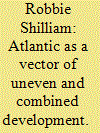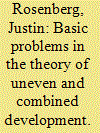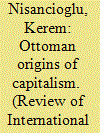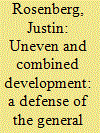|
|
|
Sort Order |
|
|
|
Items / Page
|
|
|
|
|
|
|
| Srl | Item |
| 1 |
ID:
087856


|
|
|
|
|
| Publication |
2009.
|
| Summary/Abstract |
The conversation between Alex Callinicos and Justin Rosenberg broaches an issue that is central to any sociological approach to the subject matter of international, namely, the extent to which analogies drawn from 'society'-understood as an endogenous entity-can be used to explain inter-societal phenomena. So far, the debate has focused analytically primarily upon the relationship between class conflict and geopolitics, and has exhibited a substantive focus primarily upon European history. The contribution of this article to the debate is to problematize both these foci. I suggest that Atlantic slavery and the racialization of New World identity might be the fundamental vector through which to explore the special quality of international sociality in the making of the modern world.
|
|
|
|
|
|
|
|
|
|
|
|
|
|
|
|
| 2 |
ID:
094561


|
|
|
|
|
| Publication |
2010.
|
| Summary/Abstract |
Where does 'the international' come from? What accounts for its existence as a dimension of the human world? This article attempts an answer, in three steps, using the idea of 'uneven and combined development' (U&CD). First, a depth model is constructed, comparing different ways of linking uneven development with international relations. Thus far, it turns out, these ways have all presupposed the fact of political multiplicity, rather than explaining it. In search of explanation, the article turns, secondly, to the compelling historical sociological argument of Barry Buzan and Richard Little. This locates the origins of geopolitics in the late prehistoric shift from hunter-gatherer to settled agricultural existence, together with associated processes of social differentiation and proto-state formation. Buzan and Little's explanation appears at first to pre-empt the need for the concept of U&CD. Yet closer inspection reveals that unevenness and combination play a key role in their empirical account without, however, being theorized. The third step of the argument therefore seeks to show how these are necessary parts of the process of social change which Buzan and Little describe. And in this way it emerges that the origins of 'the international' do indeed lie in the uneven and combined character of historical development.
|
|
|
|
|
|
|
|
|
|
|
|
|
|
|
|
| 3 |
ID:
087858


|
|
|
| 4 |
ID:
087854


|
|
|
|
|
| Publication |
2009.
|
| Summary/Abstract |
What is the status of Trotsky's notion of uneven and combined development within Marxist theory and how might it be fruitfully employed by Marxists in international relations? Is uneven and combined development a transhistoric general abstraction or does it need rooting in the relations, processes, tendencies and counter-tendencies of a particular mode of production? This article rejects Justin Rosenberg's recently drawn conclusion that uneven and combined development is usefully understood as a transhistoric general abstraction that potentially offers the basis of a transhistoric theory of the international. Instead it questions the value of transhistoric categories for Marxist theory and pursues the argument that uneven and combined development is best understood within the relations, processes and tendencies of the capitalist mode of production, arguing that capitalist social relations and political forms are historically unique in their capacity to generate both combination and unevenness.
|
|
|
|
|
|
|
|
|
|
|
|
|
|
|
|
| 5 |
ID:
191665


|
|
|
|
|
| Summary/Abstract |
This article argues that while uneven and combined development (U&CD) scholars have made great contributions to theorising the causal implications of societal multiplicity, the overtly normative contributions of U&CD scholarship remain thin. To address this gap, I propose a synthesis between U&CD and Enrique Dussel’s normatively oriented liberation philosophy. To enable this, U&CD must be stripped of its more causally oriented concepts, like the ‘whip of external necessity', which constrains the scope of normative analysis by confining it to sovereign states. Incorporating Dussel’s liberation philosophy and its concept of exteriority into U&CD’s social ontology enables seeing beyond the states-system and allows for the inclusion of stateless peoples as entities and agents of global politics. This is demonstrated by applying the combined conceptual framework to the Chiapas Zapatista movement’s relation to the Mexican state.
|
|
|
|
|
|
|
|
|
|
|
|
|
|
|
|
| 6 |
ID:
131709


|
|
|
|
|
| Publication |
2014.
|
| Summary/Abstract |
The history of capitalism's origins is unmistakably Eurocentric, placing sixteenth-century developments in politics, economy, culture, and ideology squarely within the unique context of Europe. And while the disciplinary remit of International Relations (IR) should offer a way out of such European provincialism, it too has been built on largely Eurocentric assumptions. In Eurocentric approaches, the Ottoman Empire has been absent, passive, or merely a comparative foil against which the specificity and superiority of Europe has been defined. And yet, the Ottoman Empire was arguably the most powerful actor in the Early Modern period. In this article, I argue that any history of capitalism's origins must therefore account for the historical importance of the Ottomans. In doing so, this article seeks to address the non-European blind-spot, both in theorisations of capitalism's origins and in IR theory, by reincorporating the material significance of the Ottoman Empire in historical processes, which led to the transition to capitalism. I do so by utilising the theory of Uneven and Combined Development, and in the process seek to defend its credentials as a non-Eurocentric social theory on the one hand and as a sociologically and historically sensitive theory of international relations on the other.
|
|
|
|
|
|
|
|
|
|
|
|
|
|
|
|
| 7 |
ID:
191666


|
|
|
|
|
| Summary/Abstract |
Scholars exhibit a general self-reflexive tendency to purge Eurocentrism from UCD in order to strengthen the concept. Yet, unless the role of the cultural in UCD is adequately theorised, UCD cannot fully overcome Eurocentrism. This article therefore advances a non-Eurocentric cultural theory of UCD based on Althusser’s theory of ideology by positing that the ‘whip of external necessity’ and the ‘privilege of historical backwardness’ are cultural conditions specific to capitalism. I argue that in order for capitalism to reproduce itself, it relies upon a temporal ideology called ‘development.’ However, capitalism also produces a material effect I call the ‘spatialisation of unevenness’ that contradicts the ideology of development. This contradiction is, however, mediated by the ideology of nationalism. The result of this mediation is the internalisation of development as a whip of external necessity and the privilege of historical backwardness as a privilege of national culture in the ideology of nationalism.
|
|
|
|
|
|
|
|
|
|
|
|
|
|
|
|
| 8 |
ID:
151318


|
|
|
|
|
| Summary/Abstract |
One of the more interesting and potentially powerful developments within Marxist approaches to the field of international relations has been the recent revival of Trotsky’s concept of uneven and combined development (UCD). However, it appears that there have been very few attempts within this literature to specify in concrete terms what is meant by mechanisms of ‘combination’. Failing this, UCD runs the risk of falling into triviality. To this end, this article suggests that migration has historically functioned as a crucial element of combined development, contributing to the uneven incorporation of non-capitalist societies into the remit of a developing world capitalist market. As illustration, I take settler-colonial development and the Great Atlantic Migrations as my focal point, drawing out a comparative study of Argentine and Canadian wheat production in the late nineteenth century. In positing these migrations as mechanisms of combined development I suggest that such were the means by which both European capitalism developed extensively and intensively and New World societies were subjected to the ‘pressures of backwardness’, compelled to transform their own social relations of production.
|
|
|
|
|
|
|
|
|
|
|
|
|
|
|
|
| 9 |
ID:
186290


|
|
|
|
|
| Summary/Abstract |
This article responds to criticisms of the current revival of Uneven and Combined Development (UCD), particularly those aimed at the idea of a ‘general abstraction’ of UCD. Three main charges have been pressed: that UCD is not a real theory; that its transhistorical extension has reduced it to an unhistorical reification; and that its language of ‘advanced’ and ‘backward’ betrays its enduring Eurocentric foundations. The article argues not only that UCD can be defended, but also that it is the general abstraction which enables UCD to make its strongest contributions to solving problems of theoretical insufficiency, ahistoricism and Eurocentrism in social thought more generally. Finally the article ends by speculating on the reason why the much-maligned general abstraction of UCD should turn out to be of such significance.
|
|
|
|
|
|
|
|
|
|
|
|
|
|
|
|
|
|
|
|
|